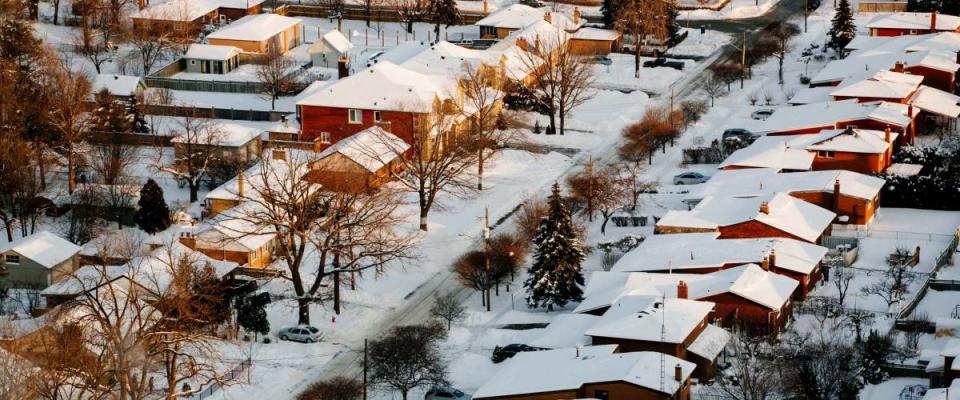Mortgage Rates Drop to a Record January Low Amid Coronavirus Scare

As the threat from the deadly coronavirus rattles world financial markets, borrowers in the U.S. are getting a benefit. Already-low mortgage rates are falling further and are now at all-time lows for late January, according to a popular survey that's tracked rates for nearly half a century.
Buyers shopping for homes and homeowners looking to refinance are finding loans with bargain rates and low monthly payments.
If you're in one of those groups and you see a great rate, you should consider locking it so it won't slip through your fingers.
Mortgage rates are lowest ever for late January

Mortgage rates have hit a record low this winter.
Mortgage rates have fallen for a second straight week, and 30-year fixed-rate mortgages are now averaging 3.51% — down from 3.6% a week ago, Freddie Mac reported Thursday. The rates in the survey come with an average 0.7 point.
“This week’s mortgage rates were the second lowest in three years, supporting homebuyer demand and leading to higher refinancing activity,” says Sam Khater, Freddie Mac’s chief economist, in a statement.
Early last September, 30-year mortgage rates plunged to an average 3.49%, which was the lowest since the fall of 2016.
But here's another big milestone for today's sunken mortgage rates: They're the lowest for late January in the 49-year history of the Freddie Mac survey, according to a MoneyWise.com finding that Freddie Mac has confirmed.
“Borrowers who take advantage of these low rates can improve their cash flow by lowering their monthly mortgage payments, giving them more money to spend or save," Khater says.
Rates are marching closer toward the all-time low of 3.12% reached in November 2012. One year ago, 30-year fixed mortgage rates were nearly a full percentage point higher, at an average 4.46%.
The connection between coronavirus and mortgage rates

Mortgage rates are down this week because the rapid spread of the coronavirus in China has caused anxious investors to pull money out of stocks and plow it into Treasury bonds as a safer investment for uncertain times.
Demand for Treasuries pushes their prices higher and their yields, or interest rates, lower — and mortgage rates typically follow the same track.
The low rates on home loans are pumping up demand for mortgages and homes. The Mortgage Bankers Association says mortgage applications jumped 7.2% during the week ending Jan. 24, and sales of previously owned homes rose 3.6% during December, according to the National Association of Realtors.
"If rates fall as a result of the coronavirus, but the virus does not hit the U.S. hard, the real estate market will get hotter as the spring market proceeds into the highest selling months of the year, March through July," says Corey Burr, senior vice president with Sotheby's International Realty in Chevy Chase, Maryland.
Reduced rates can make a big difference to buyers and give them more leverage, Burr says.
"A 30-year fixed mortgage for $500,000 at 4% has a principal and interest payment of $2,387," he says. "If the interest rate drops to 3.5%, that same payment of $2,387 can qualify a buyer for a loan amount of $531,500."
Low mortgage rates also are getting the attention of homeowners: Applications for refinance loans increased 8% last week and were up 146% from a year earlier. Owners are finding they can save through a refi even if their current mortgage is from 2018.
The outlook for mortgage rates and housing

Homebuyers and homeowners can expect to keep finding low mortgage rates.
Mortgage rates are expected to stay at historically low levels for the foreseeable future. A recent forecast from Freddie Mac's corporate sibling, Fannie Mae, predicted 30-year fixed-rate mortgages would avearge 3.7% throughout both 2020 and 2021.
Last year, the average for the benchmark mortgage rate was 3.9%.
The Federal Reserve opted to make no changes in interest rates at its late January meeting, which ended Wednesday. Burr says that offers a good environment for keeping mortgage rates down.
"Stability of rates at relatively low levels breeds economic growth, and that’s beneficial to real estate, even though [the Fed's] keeping their rates level may not make mortgage rates go up or down in any appreciable manner in the short term," he says.
Other mortgage rates this week

Rates on home loans are down across the board.
Rates on 15-year fixed-rate mortgages have slid to an even 3%, on average, from 3.04% last week. Those loans are a popular choice for refinancing.
A year ago, 15-year mortgages were averaging 3.89%, Freddie Mac says.
And, rates on 5/1 adjustable-rate mortgages have tumbled this week. Those loans — known as ARMs — are fixed for five years and then can adjust up or down every year after that.
ARMs are currently being offered at an average initial rate of 3.24%, down from last week's 3.28%. Last year at this time, the starter rates on ARMs were averaging a stiffer 3.96%.

 Yahoo News
Yahoo News 
